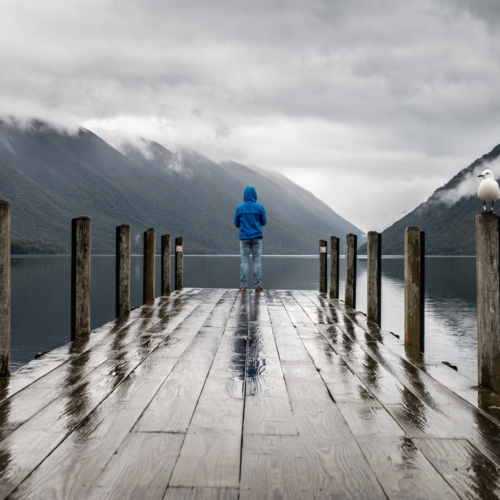By: Christina Coates
The sheer number of Podcasts that I am subscribed to is mind-boggling. One would rightfully wonder where I find the time to listen to each episode. Everything from Fresh Air to Two Disabled Dudes to This Week in Neuroscience. I didn’t consider that a Neurology Podcast would remind me that my Rare Disease is always there, even when I drown myself in information and tasks to try to forget about it.
As a child, I remember struggling with what I now know as depression and anxiety. I would cry alone, but I would not have a name or reason for my sobs. I would later learn that exercise, running (in particular), helped me to keep the tears away. I grew to feel that tears were for the weak, and I was anything BUT weak. I remember a day that my spouse complained that he needed to eat because he felt weak. I shot him a glare from across the room and told him to NEVER say that again. Weakness had no place in my life, and I sure as heck was not going to allow my husband to be weak.
Leading up to the diagnosis of a Sporadic Cavernous Malformation on my Cerebellum, I had daily migraines. Not weekly, not occasionally, but DAILY. These are not the “migraines” that some people claim to have, which is probably more of a headache. My migraines were very tough. They still are. No matter how much it felt like I wanted to bury myself under blankets and never see light again, I would force myself to get up and go to work. I was that jerk at work who made everyone else look bad because I was always there. One year, I proudly proclaimed to my boss that I “…hadn’t used even one sick day…” that year. He was not impressed. Why did I struggle though this? I did it because I didn’t want to be weak. I didn’t want to give into my depression and anxiety.
When I was diagnosed with the Cavernous Malformation, I was terrified. To be told that you have a lesion in your brain that is right by your brain stem that had evidence of a prior bleed is enough to launch anyone into depression and panic. I went directly into work to warn my boss that I was probably going to have to have brain surgery, which was not at all what my Neurosurgeon and Neurologist told me, but I let the anxiety take me there. In fact, I lived with that little booger for years up in my melon without any problems (aside from the migraines). When he started acting up again in 2020, we decided to have him evicted in 2021. Ah, the joys of needing a highly specialized brain surgery during a worldwide pandemic. That is a story for another time.
After the eviction, I did all my therapies diligently. I was a favorite at Physical Therapy. The surgery affected my balance, so I named myself “The Drunk Baby”. I was always of the mind that you should give yourself the degrading nickname before someone else does. That way, you can minimize the emotional hurt. When I didn’t do an exercise perfectly, I would do it over. The technicians all got to know me well, and when they saw me do something with less than a full fervor, they would look at me, and I would announce that yes, I did plan to do it again.
I eventually graduated from therapy, only to lose the balance and grace that I had learned over all those weeks. I was seeing double. My vision was bouncing. I had spots of numbness in my face and my arms and legs. This is when I was diagnosed with Hypertrophic Olivary Degeneration.
I had known Depression and Anxiety my whole life. They were my constant companion over all the years. I did not know just how dark my mind would take me once I realized that I would never be the same as I was, and that my brain stem was degenerating. I didn’t want to live anymore. I made it known that I was willing to live if my husband was alive. After that, I would end it. I had decided that our children were old enough to deal with me unaliving myself. After all, what would I have to look forward to in life? As far as I was concerned, I couldn’t see making anything good out of what was left of my life.
It is unfortunate that we don’t seem to have the approach of providing mental help to patients who are thrown into these rare waters. Often, patients are given diagnosis’ like HOD over the phone or in a very nonchalant manner. Since our condition is so rare that most neurologists and neurosurgeons don’t know anything about it, they treat it as if it is not a big deal. While the patient and family are left to figure out how to navigate this new life.
It has been almost a year since I was diagnosed with the Ultra Rare Hypertrophic Olivary Degeneration. Although I am coping much better now, and I have found value in my continued existence, I still have moments of despair and terror and fear and, yes, even weakness. Yesterday, I was listening to a very technical Neurology podcast (This Week In Neuroscience)that was discussing a paper on Parkinson’s and Alzheimer’s diseases. It was asked if patients die of these diseases, and the answer kicked me right square in the face. No, these neuro Degenerative diseases don’t kill the patient. Usually, it is aspiration of liquid and food into the lungs, or something along those lines. The disease doesn’t kill us, it’s the stolen brain function that does. And there they were, all at once. My old friends, Depression and Anxiety

Leave a Reply